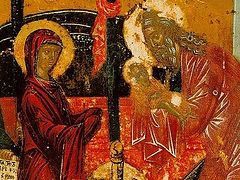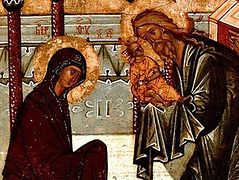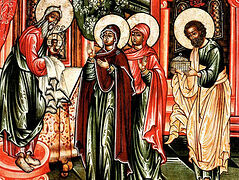In the name of the Father, and of the Son, and of the Holy Spirit!
We have gathered today, beloved brothers and sisters, in this holy church to celebrate the feast of the Meeting of the Lord together with the Church. Among the many hymns of this feast is one that is usually known to every Christian and is received by everyone with a special warmth of soul. This is the hymn of the Righteous Simeon the God-Receiver: Lord, now lettest Thou Thy servant depart in peace… When the holy Church either reads or sings this hymn, many pray with great concentration, with great feeling in their souls, and some—on their knees.
Why is this hymn so dear to every Christian? Because, dear brothers and sisters, everyone has their path in life, and how long it will last is given to none to know or measure. Some are still in the “morning” of their lives, and everything seems to be in a rosy light for them.
This short and joyous period of time passes, and a man finds himself in mid-life. This is a time of conscious life; it’s a time fraught with many temptations and seductions, with all kinds of sins. A man consciously chooses one or another path for himself at this time. It may be the path of sin and vice, or it may be the most difficult path, leading to his salvation and to eternal truth. In this period, the holy Church edifies a man, calling him to spiritual perfection, to a life of righteousness.
And this period passes, and then comes the “evening” of a man’s life. This is a very important period. And who among us isn’t aware that soon or later, perhaps suddenly, perhaps with a serious illness, with an infirmity, death will inevitably come for him? But no one knows when it shall draw near. During this period, the Christian learns from the Church to pray with fervent prayer. The Church helps him in this sometimes very difficult time of old age. And a man fervently prayers that the Lord might make this time peaceful, painless, and carefree for him.
So it was with the Righteous Simeon the God-Receiver, who met the Divine Child Christ on the threshold of the Jerusalem Temple. Righteous Simeon was told from above that he wouldn’t see death until he saw the Coming Christ. And now He sees Him. He was drawn to the Temple by some extraordinary force. And when he, of very advanced age, arrived, he received the Divine Infant Christ into His arms. And then he said these words: Lord, now lettest Thou Thy servant depart in peace.
The time came when he could die, and his death should be peaceful. For mine eyes have seen, continued Righteous Simeon, Thy salvation, which Thou hast prepared before the face of all people. He saw this salvation in the Divine Child Christ Himself, and the rest he perceived through Sacred Scripture, as they might say now—”with the eyes of the mind.”
You and I, dear brothers and sisters, are much more blessed than Righteous Simeon, because we have not only seen salvation, but we have it—salvation is within us. This happens when we commune of the Holy Mysteries of Christ with the deepest faith, with fear of God. They bring us salvation; they work it within us. For Holy Scripture tells us that he who worthily communes of the Holy Mysteries of Christ is united with the Savior and Lord.
We see a lot of things that are salvific for us throughout our lives. And we not only contemplate this salvation, but this salvation comes within us and rests within us.
The Holy Spirit, Whom we receive in Baptism, is our salvation. The chance to be completely cleansed from sin and vice in the Mystery of Repentance—this is also our salvation. It’s the kind of salvation that allows us to draw near to the chalice with Holy Communion. There’s a Mystery in which marital life is blessed, when, together with the Church, people offer up prayers for a happy, prosperous marriage. In the holy Church there is the Mystery of Unction, which is served in times of serious illness. Therefore, I repeat, we are more blessed than Righteous Simeon the God-Receiver, because he only saw salvation, while we not only see it—we know that we are united with Christ the Savior Himself, and His salvation is among us.
We must, dear brothers and sisters, pay attention to the hymns that the holy Church sings during the All-Night Vigil. Here are the refrains sung at the ninth ode of the canon. We ought to delve deeply into their content, and we’ll see how the Mother Church, which loves its children, calls us to our salvation, to spiritual perfection. And if we fail, the Church turns to the Mother of God, to the Savior and Lord Himself to ask that salvation might be sent down upon us. “O Virgin Theotokos, thou hope of Christians: Do thou protect, preserve, and save those that hope in thee.” What inspired words and how easy it is to pray with these words! And what poetry and spiritual beauty there are in these words! “The pure dove, the unblemished ewe doth bring the Lamb and Shepherd to the Temple.”
Here is the request to the Mother of God for her intercessions: “O Virgin Mary, do thou enlighten our souls, cruelly darkened by the pleasures of life.” And to the Savior and Lord Himself: “O Christ, King of all, do Thou grant me fervent tears, that therewith I might cleanse my soul, fallen into sins and devoured by evil.” There are many edifying moments in the refrains of the ninth ode. It’s not by chance that the holy Church presents them to us, especially to those for whom the “evening” of life has already come, making our prayer easy, calling us to realize our sinfulness, teaching us, if we ourselves are unable, to lead a Christian life worthy of our calling.
Dear brothers and sisters, on this great feast we not only glorify the Most Holy Virgin Mary, but we turn to her with our spiritual prayers for our deliverance from sins and vices. And those hymns that the holy Church presents to us, especially to those who are in the “evening” season of their lives, accept them into their hearts with faith.
Amen.




